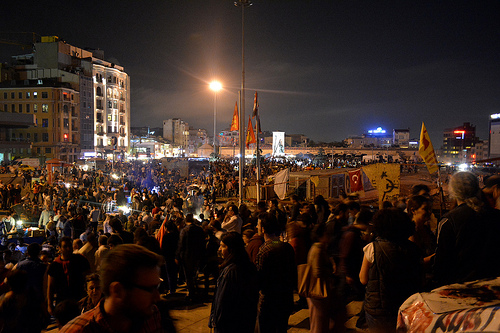Three Viewpoints on Turkish Discontent
by Sampsonia Way / August 15, 2013 / 1 Comment

Taksim Square, Istanbul, June 14, 2013. Photo: Meg Rutherford via Flickr. Creative Commons.
On May 30th, a small demonstration in Turkey transformed into a national uprising. Initially people had gathered in Gezi Park to protest its planned demolition. When these demonstrators were violently evicted by the Turkish police, the movement became something larger: Outcry against the policies of Prime Minister Recep Tayyip Erdoğan. Soon large protests formed in seventy-nine Turkish cities, including in Istanbul and Ankara, and the government has estimated that 2.5 million people have attended the Gezi protests.
To get an inside take on the causes and potential outcomes of the situation in Turkey, Sampsonia Way reached out to Tarık Günersel, the president of PEN Turkey, for contacts in the Turkish media. Below we present the opinions of Zeynep Oral, Mine Kırıkkanat, and Süreyyya Evren.
Zeynep Oral is a journalist for Cumhuriyet, a daily Turkish newspaper, and a co-founder of the Women Initiative for Peace. Mine Kırıkkanat, called Turkey’s “first female humorist” also writes for Cumhuriyet. Süreyyya Evren is the author of six novels and short story collections as well as the founder of Siyahî (Blackish), a Turkish cultural magazine.
1. What is happening in Turkey right now, regarding the protests?
Oral: It’s no longer just about Gezi Park. It’s gone beyond that. What all these people are opposing is, firstly, the violence of the police but they’re also opposing what has been accumulating for the past 10 years. Under Erdogan there have been changes to the educational and legal systems. Erdogan has told women they should have at least three children and should stay at home. He calls anyone who drinks alcohol an alcoholic, and he decides what statues, bridges, and buildings can be built. One person cannot be a gynecologist, philosopher, engineer and architect at the same time.
Power is so dangerous, and it matters how you use it. If you don’t share your power and think that democracy is only how many votes you got, it won’t work. Democracy is trying to find out what the minority is thinking.
Evren: We are witnessing a grassroots movement and a widespread civil awakening. Protests began by defending a park against a proposed shopping mall –and this beginning is important– but now it is also a movement of dignity. Protests are changing form; they are not just protests now, they are also direct democracy experiments taking place all over the country. It is also very important that protests are gathering around so many different groups: LGBTT (Lesbian, Gay, Bisexual, Transvestite, and Transsexual) activists, socialists, anarchists, ecologists, NGO workers, precarious middle-class employees, white collars from big companies, anti-capitalist Muslims, artists, and workers. This has become the most plural dialog I have ever seen in Turkey.
Protests can also be seen as a formation of Multitude on the streets.
Kırıkkanat: Rallies have become rarer since the protests were harshly repressed, but people are angered by the government’s retaliation tactics. These tactics include arresting young people for tweets they posted in June, prosecuting leaders like actor and director Memet Ali Alabora (the court is demanding he be sent to prison for twenty years!), searching private homes, and auditing the Koç Group‘s refinery because one of the group’s properties, Hotel Divan, opened its doors to the injured during the demonstrations.
2. What are the causes of this event?
Oral: Gezi Park was one drop into a glass, but it made a huge explosion.The police violence was so disproportional, and that’s what made it explode. Sometimes you just need one drop.
Evren: There are local and global reasons. Local reasons are best described as a search for dignity. Turkish government has been taking a very authoritarian route and censored the media in a heavy way. People began to feel like a police state was being formed. Also they feel there is an attack on secular lifestyles in new government policies like restricting alcohol, new anti-abortion laws, and other anti-women regulations and discourses. A lot of women took to the streets because of this.
Globally both the Tahrir and Occupy movements gave inspiration and encouragement to people in Turkey. When they were angry they knew there was an alternative.
Kırıkkanat: In Istanbul, everyone, even those who voted for the AKP (Justice and Development Party), has had enough of the concrete that’s drowning their city. In a metropolis with 17 million inhabitants, the little park, Taksim Gezi, is a rare green space. First the city was sacrificed to Erdogan and his cronies’ greed for rental properties; then it was cemented over in obvious poor taste. The Turkish people aren’t stupid. They know that Erdogan is mocking the country’s secularists yet again. Military barracks once stood on the proposed building site, and this is where, on April 13, 1909, Islamist soldiers demanding Sharia law killed progressive soldiers and civilians by hacking them to death with axes. The replica would be a memorial to this Islamist revolt.
There are other reasons too. For ten years, Erdogan has forced his outdated values on a large portion of the population that didn’t vote for him – half the country. He views these people with contempt, he ignores them, and he subjects secular youth, who grew up free, to all kinds of prohibitions.
This is causing enormous discontent. Every day, the government forbids something new. For ten years, we’ve been surrounded by Islamists who are forcibly pushing us towards an Islamic regime. We don’t want one! The youth want one even less.
Taksim Square is important to our collective memory. This is where, in the 1970s and 1980s, young students demanded liberty and democracy, and workers demanded rights for the leftist unions. This is where they spilled their blood fighting military and civil tyranny. The famous “Bloody May Day” of 1977 left an indelible painful mark there; this is why the square was closed to demonstrations after the 1980 coup d’état.
The current wave of protests has nothing to do with the Arab Spring. The protestors are largely members of the well-off and secular class. They aren’t unemployed, they aren’t demanding food. They’re demanding freedom of expression and the freedom to decide how to think and live, which is being taken from them little by little each day.
In this respect, today’s movement might be more accurately compared to May 1968. These Turks have the means and want to live life as they choose; they’re demanding the freedoms they once enjoyed.
3. What do you think will happen?
Oral: I know one thing: it will not go on like this. People are saying “Don’t interfere with my way of living. That’s my personal business.”
The demonstrators are not a block. It’s a huge variety of people which has come together with their differences and spontaneously.
Evren: We are learning that a riot has its own rhythm. In June it was very intense, then it slowed a bit in July. But the consequences already obvious. It empowered Turkish citizens so powerfully. Turkish democracy improved, and Turkish people are more hopeful about their own potential.
Kırıkkanat: I’m trained as a sociologist. This perspective leads me to believe that we’re at the very beginning of a popular revolt that will regain momentum when the academic year starts.
I believe the universities will assume leadership of the protests in October. The economy is bad, and, in all likelihood, discontent will continue to grow.
What happens next depends not only on the situation inside Turkey but also on the regional situation. An outbreak of violence at the Turkish borders or a clash between Turks and Kurds could reignite hostilities and lead to out-of-control conflict.
Due to conflicting schedules, Zeynep Oral’s quotes are taken from an interview on NRK Skole, a Norwegian television show. This was done with her permission, and the full interview can be viewed here.
Mine Kırıkkanat’s answers were translated from French by K. Anna Lauriņa.








One Comment on "Three Viewpoints on Turkish Discontent"
I am grateful to Sampsonia Way for focusing on the Gezi Park events and to the three intellectuals -Zeynep Oral, Mine Kırıkkanat and Süreyyya Evren- for sharing their views.
Solidarity for human rights and democratization is vital for any sort of significant progress on our planet.